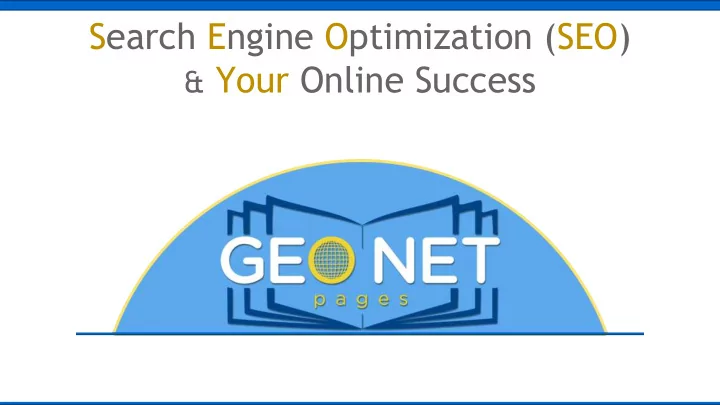

Search Engine Optimization (SEO) & Your Online Success
What Is SEO, Exactly? SEO stands for “Search Engine Optimization”. It is the process of attracting & keeping traffic from the “free,” “organic,” “editorial” or “natural” listings on search engines.
How Search Engines Work 1. A search engine spider (such as Googlebot), crawls websites to process the website’s content and information. This “discovery phase” will ALWAYS be essential. 2. The search engine spider (or algorithm) uses the data it collects from its site crawl to sort and analyze your website URLs. 3. These crawl and index decisions are then used in real time to create a ranking prioritization for your website. These priorizations are constantly being fine- tuned. 4. The process starts all over again. Wash, rinse, repeat.
How Search Engines Work The crawl process is essential to how a website will be ranked. There are many technical issues that search bots can run into... ● Crawl traps (whether intentional or unintentional) ● Unnecessarily crawled pages ● Duplicate content ● Frequency and depth of crawl ● Existence of 302, 304, 307, 5xx errors on the site and/or other server response codes ● Existence of redirect chains and loops ● Excessive or unnecessary 404 error pages (Page Not Found)
How Search Engines Work When crawling, search bots will consider the following on-page elements to determine your page and site relevancy: ● Page Titles ● Header Tags ● On-page content and existence of relevant keywords ● Images, including their file names and alt text ● Meta descriptions ● Meta tags: noindex, canonicals, alternate, etc…. ● Page URLs
Why is SEO Important? Search Engine Algorithms are ALWAYS changing. A successful past performance in search engine rankings is no guarantee for continued success with future results.
Why is SEO Important? Successful Past Performance is NO Guarantee of Future Results! “Old School” SEO was easy and it worked fast! In the past, link building and keyword stuffing ruled the SEO world! ● Link building worked ● Link building skewed results ● More links = better SERP (Search Engine Results Page) presence ● Manipulation of anchor text and landing pages ● Manipulation of keywords ...but search engine algorithms are constantly changing and updating their standards...
Why is SEO Important? Why isn’t my site ranking as well as it used to? REMEMBER… Past Performance is NO Guarantee of Future Results. Algorithm changes over the past 2-3 years have affected sites that relied heavily on paid linking and/or had thin content.
(Big) Algorithm Changes Google fought SERP results with Pandas and Penguins…
Algorithm Changes Google’s “Panda” Update: 02/23/11 A major algorithm update hit sites hard, affecting up to 12% of search results (a number that came directly from Google). Panda cracked down on thin content, content farms, sites with high ad-to-content ratios, and a number of other quality issues. Panda rolled out over at least a couple of months, and Google still continues to release Panda updates to this date.
Algorithm Changes Google’s “Penguin” Update: 04/24/12 After weeks of speculation about an "Over-optimization penalty", Google finally rolled out the "Webspam Update", which was soon after dubbed "Penguin." Penguin adjusted a number of spam factors, including keyword stuffing, and impacted an estimated 3.1% of English queries. Penguin also rolled out over a couple of months and Google still continues to release Penguin updates to this date.
Algorithm Changes Google’s “Hummingbird” Update: 08/20/13 Hummingbird was a quiet algorithm update that went live roughly a month before Google announced it. It is a core algorithm update that may power changes to semantic search and the Knowledge Graph for months to come. Hummingbird integrates ‘entities’ rather than individual key terms. This makes quality content much more important for websites to stay relevant for queries.
Algorithm Changes Google’s “Pigeon” Update: 07/24/14 Unofficially named “Pigeon” by the search engine community, this algorithm was quietly released a couple weeks ago and immediately shook up local SERPS. Google has commented that “Pigeon” has tied the local algorithm and traditional core algorithm closer together, resulting in more accurate, relevant local searches. The algorithm is still in flux and the dust hasn’t settled yet. What is known is that SERP layouts have been rearranged and local directories (Yelp, etc.) have gotten a boost...but we don’t yet know how long this will last or what the full ramifications are.
SEO and other Marketing Channels Ideally, SEO should be integrated into other online marketing channels... ● Paid ● Local ● Mobile ● Social A site that is properly structured for SEO will help: ● maintain and increase quality score ● reduce paid ad costs ● increase local search presence ● optimize for mobile results ● encourage social sharing
Ultimately, SEO is All About... ● Users ● Competition ● Action
SEO is All About : Users Google, and any other search engine, only exists for ONE reason: to build a business around pleasing its users. Therefore, we must constantly remember… IT’S REALLY ALL ABOUT THE USERS
SEO is All About : Competition Also, because SEO is by nature a competitive exercise, and earning top rankings is at the expense of your competitors, we must also note… IT’S ALL ABOUT COMPETITION
SEO is All About : Action Knowing what SEO is all about allows us to initiate several tactics based on each phase of activity. This can help to build an overall SEO strategy. This circular method ensures we pursue SEO objectives according to the processes search engines currently employ.
Recommend
More recommend